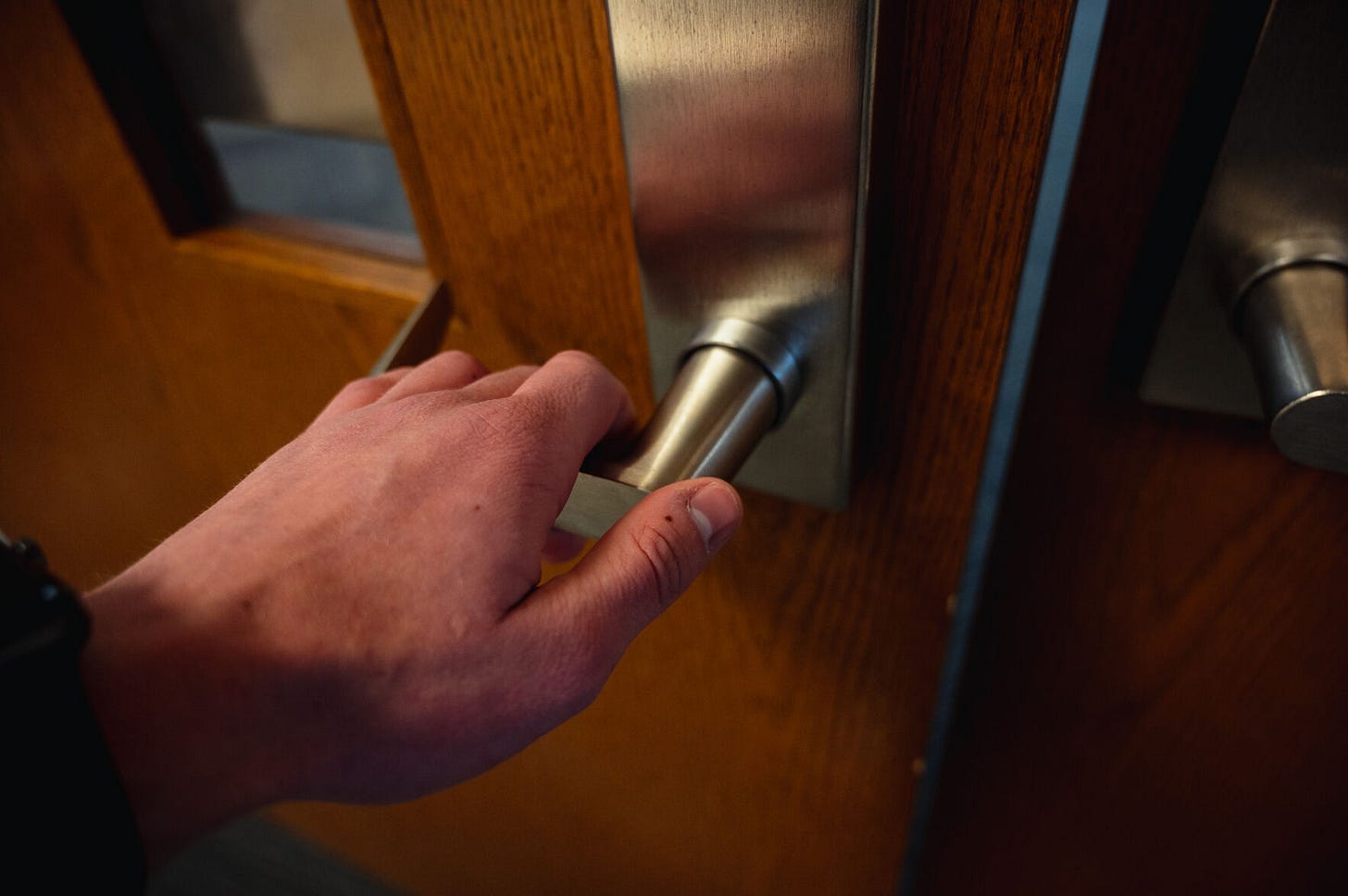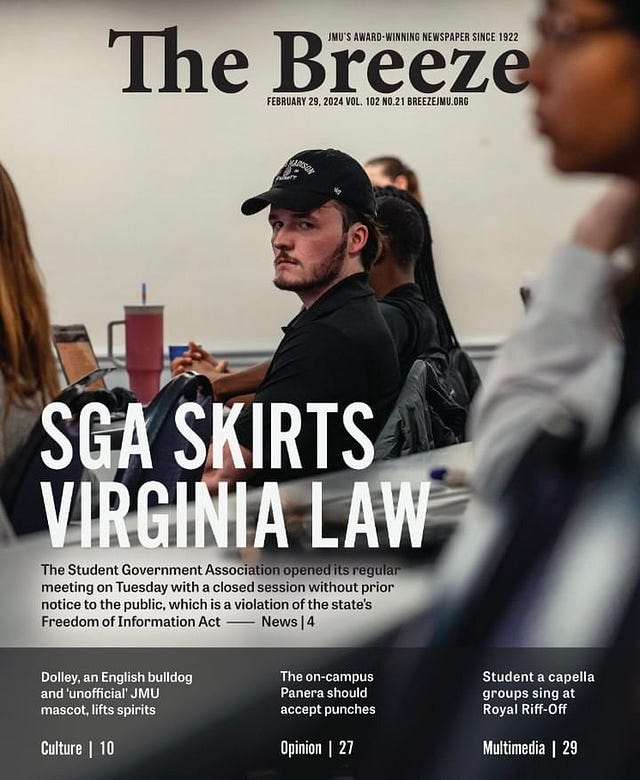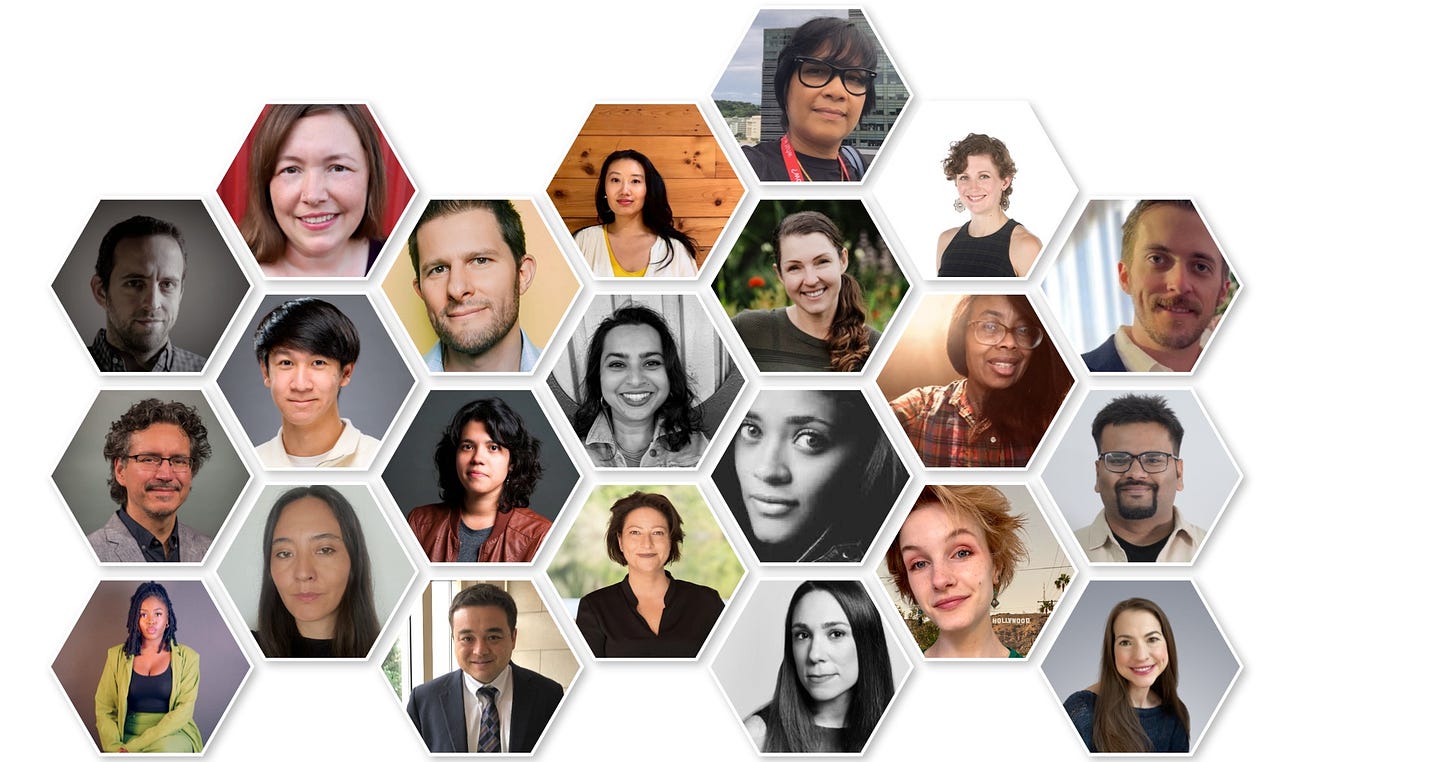'Not how FOIA works.' Except it is
Virginia, New Hampshire student editors clash with student governments over open-meeting laws

It has been a routine for student journalists at The Breeze, a newspaper at James Madison University, to cover student government meetings.
A recent forum, however, took an unexpected turn.
News Editor Eleanor Shaw got a text from the student president stating that the first 30 minutes of the meeting would be closed, a move she contested, citing the state Freedom of Information Act.
Upon arrival, Shaw, along with a reporter and two photographers, were asked to leave.
Armed with a FOIA handbook, Shaw asked under which of the 54 FOIA exemptions the student government could close its meeting before officially beginning with an open session and voting to close.
That was when an advisor and an administrator defended the decision, arguing it wasn’t a closed session but “a meeting with senators” and that this wasn’t “how FOIA works” because it wasn’t “a document that you can FOIA later.”
Realizing there wasn’t much they could do, Shaw and her team exited the room.
“The issue wasn't the fact that The Breeze was kicked out of the meeting,” Shaw said. “But it's the fact that, along with us, the public was kicked out of the meeting.”
The incident in Virginia echoed a disagreement about open-meeting laws between student journalists and student governments, a clash also previously seen at other public universities, including one in New Hampshire last year.
Lindsie Rank, a student press counsel at the Foundation for Individual Rights and Expression, said that while state open-meeting laws may not explicitly include student governments, it’s implied.
“They're broad enough that they really cover any agency that is in sort of a decision-making or a financial position to make decisions on behalf of the state,” Rank said, and that would cover elected students who handle student fees.
Rank said ignorance often underlies such incidents, with student governments lacking training on these laws.
“Looking at it from their perspective, there's just a bunch of 20-year-old students sitting around and making decisions,” Rank said. “They may just not realize that they're subject to these laws.”
Administrators and faculty are also not always up-to-date with First Amendment-related laws as they usually focus on other educational issues, she said.
After the Virginia incident, a JMU spokesperson acknowledged that the student government is subjected to FOIA requirements and emphasized the university’s commitment to legal compliance.
If there’s one thing that Shaw wanted to come out of this, she said it would be greater transparency on campus and general education on FOIA and free speech.
Rank, who leads FIRE's Student Press Freedom Initiative, said an increased education on this issue would prevent reoccurrence.
Student journalists at Plymouth State University in New Hampshire went through a similar confrontation last semester and saw a policy change.
Jacob Downey, editor-in-chief of The Clock at PSU, said the paper started covering student government meetings last fall. Despite the state “Right-to-Know” law ensuring access, reporters were kicked out during a vote to allocate funds.
The elected students also supplied the paper with inconsistent minutes and barred the public from recording by entering a private session, according to The Clock.
But quick Google searches of the law and a glimpse through the organization’s constitution and bylaws revealed that this wasn’t how it should be, Downey said.
In consultation with the Student Press Law Center and the New England First Amendment Coalition, he said the current interpretation of the state law would be extended to student governments.
“It’s just never something that’s been tried,” Downey said. “We were told that if this went to court, there is a chance that we would win.”
It didn’t go that far, however. The student body showed up with The Clock at a meeting to protest the student government’s practices.
Just last month, a bylaw was adopted, affirming students’ right to observe and record the proceedings.
“I immediately went to Applebee’s and got margarita drunk about it,” Downey said. “It felt like our paper could be a mechanism for change.”

The editor-in-chief said nothing that happens in the student meeting room should be “so deep, so heavy” that the student body isn’t allowed to know.
Without a reporter, Downey said there’s no real way to hold anyone in the room accountable for making “arbitrary judgment calls” about public funds.
“I think that’s bad for democracy,” he said.
A pattern
St. Edward's University: The Hilltop Views was barred from covering a student senate meeting about student concerns following the university’s decision to take down a pride flag.
University of Buffalo: The Spectrum reporter and photographers were turned away from covering a student government-sponsored event. The two groups had a dispute about the paper’s coverage.
Utah Tech University: The Sun News Daily journalists weren’t allowed to cover faculty senate meetings. The students asked the Utah attorney general to enforce the state Open Meeting Law. Faculty senate members eventually voted to open meetings.
University of Vermont: The Vermont Cynic was not allowed to attend a meeting between university and city officials about the city’s plan to address concerns around an unsafe intersection. When asked why, the response was “Does it really matter?”
Barred from public meetings? Here’s some advice
Lindsie Rank: Know who your advocates — both on campus and off campus — are and call upon them. The SPFL has a 24/7 hotline for student journalists seeking legal help. Some issues can be resolved quickly with a call from a lawyer.
Eleanor Shaw: Know your rights as a journalist and don’t be afraid to stand up for them when you see fit. The Breeze also has a boot camp for incoming editors, which she said would make sure new classes of journalists are aware of FOIA and other laws.
Jacob Downey: It’s part of the job to “raise hell every now and then when shady (thing) is being done by people who should know better.” It’s the student journalists’ responsibility to start that conversation between whomever that is and the public. But make sure you do your homework and get all your ducks in a row before you start naming names.
Extra! Extra!
I’m a part of the eighth cohort of the Entrepreneurial Journalism Creators Program, a 100-day course at the Craig Newmark Graduate School of Journalism at CUNY. It focuses on helping creators build niche journalism ventures. I pitched The Nutgraf. The first session was last week, and I’m excited about what’s ahead. Read more here.
Story Spotlight:
Nine newsrooms. One crisis. Welcome to The Mental Health Collaborative. (The Daily Tar Heel): Nine North Carolina college newsrooms partner to cover the mental health crisis faced by their communities. Read the stories from The Tar Heel, The Pendulum, The Old Gold & Black, The Niner Times, The East Carolinian, The A&T Register, Technician, The Seahawk and The Chronicle.
Featured Opportunities:
Gannett accepts applications for its Underserved Communities Internship Program for multiple roles. The summer virtual interns can be based in any state except Hawaii and Alaska.
The National Press Foundation is looking for a paid summer intern to assist staff with varied projects. This internship is hybrid remote/in-person and can be fully remote.
A free webinar by AP reporters on AI, misinformation and other threats in the 2024 elections is on March 28.
The Indianapolis Association of Black Journalists has three scholarships for high school seniors and first- or second-year college students in Indiana. The deadline is March 31.
Truth & Documentary is seeking a summer intern in its Chicago office. Apply before April 1.
The New York Financial Writers' Association has scholarships for journalism students in New York, New Jersey and Connecticut. Apply before April 15.








